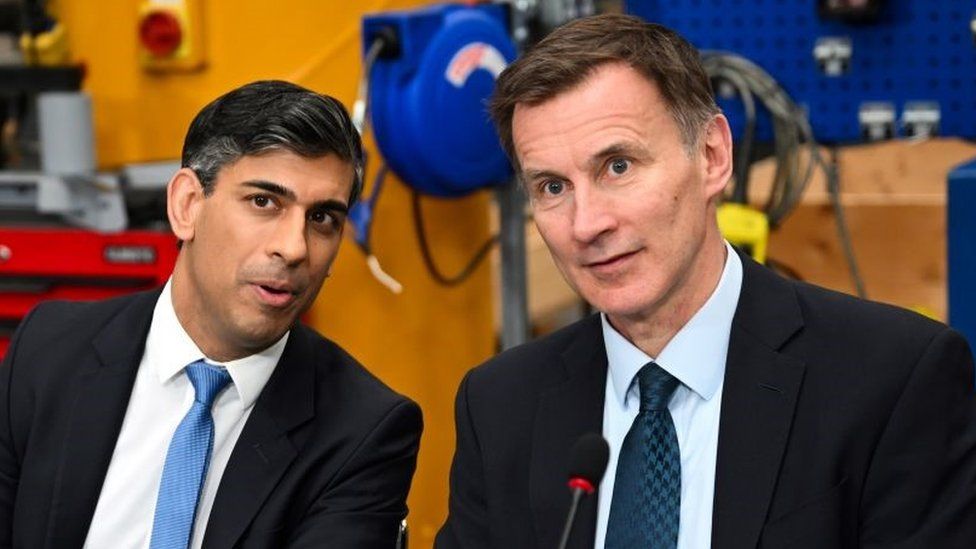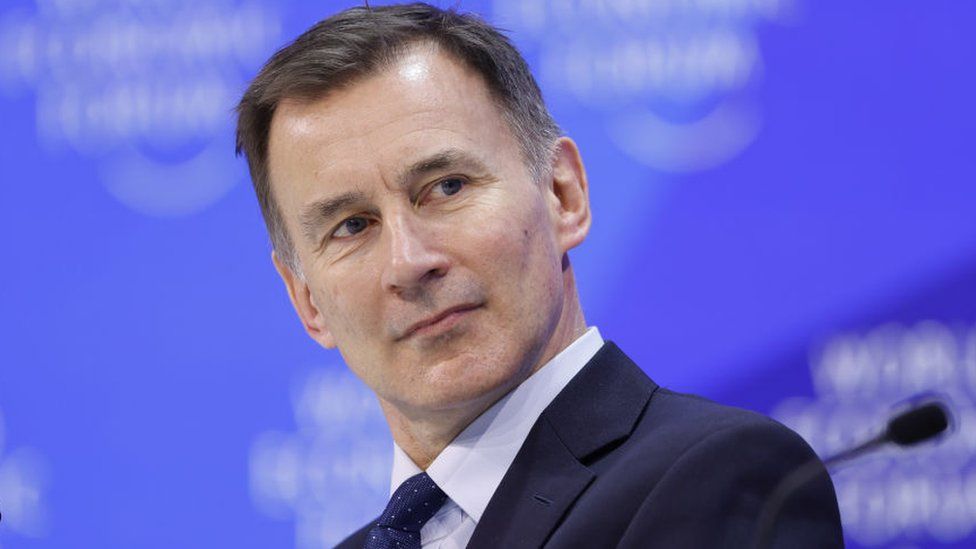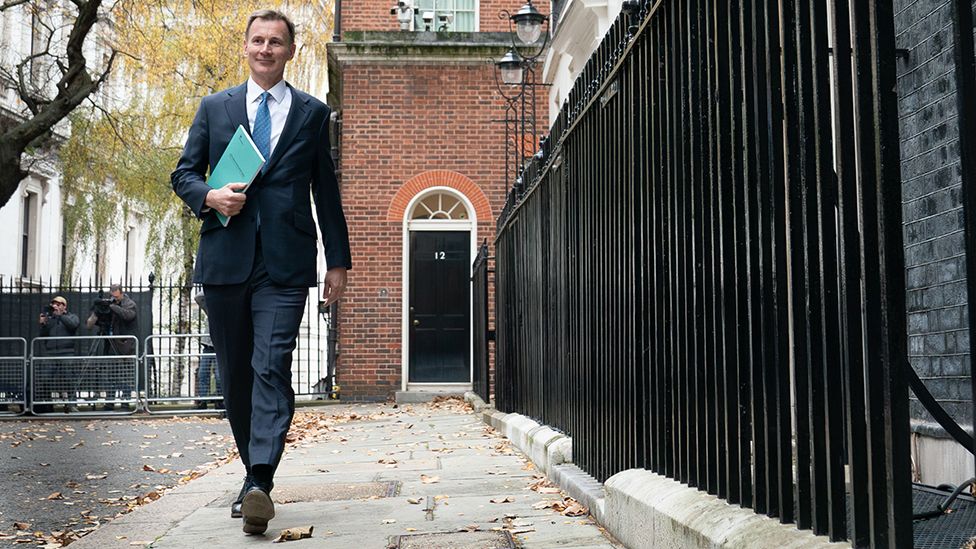
The chancellor is considering a cut in National Insurance, rather than income tax in the Budget, the BBC understands.
Jeremy Hunt is expected to make final decisions on his 6 March Budget plans at the end of this week.
A leading think tank has warned the government should not cut taxes in the upcoming Budget, unless it can spell out how it will afford them.
The government said it would not comment on whether further cuts to tax would be “affordable in the Budget”.
At last year’s Autumn Statement, Mr Hunt announced a bigger-than-expected cut in National Insurance, taking the main rate down from 12% to 10% from the start of this year.
The government’s independent financial watchdog, the Office for Budget Responsibility (OBR), said at the time this cut would help create 28,000 more jobs.
A further cut to National Insurance of 1% would cost £4.5bn per year.
As first reported in the Times, Mr Hunt is understood to be aiming for a similar approach this time, making what he calls “smart tax cuts” aimed at improving the economy.
Both Mr Hunt and Prime Minister Rishi Sunak have made no secret of wanting to reduce the taxation burden on the general public. Last month, the chancellor hinted that he was looking at trimming public spending as a way to deliver tax cuts.
- New vaping tax considered by ministers
- What is happening with income tax and National Insurance?
- Hunt mulls public service squeeze to fund tax cuts
- When is the Budget and what will it mean for my money?
However, the Institute for Fiscal Studies (IFS) said on Tuesday that the case for tax cuts was “weak”, and the chancellor should not go ahead with them without providing specific details of where the axe would fall.
Any tax cuts “should wait” until the chancellor was able to do a detailed spending review, the think tank said.
“We don’t think we should be implementing certain tax cuts now, essentially that are paid for by uncertain spending cuts that might never be delivered,” IFS deputy director Carl Emmerson said.
The IFS said taxes in the UK were heading to record-high levels when measured against the size of the overall economy. However, government debt was also high and rising, and “barely on course” to be falling in five years’ time – one of the government’s self-imposed rules.
Moreover, even this “unhappy outlook” for the public finances was based on spending cuts and tax rises, including a rise in fuel duties and changes to business rates that were “unlikely to be realised” the IFS said.
“There is therefore only a weak economic case for another sizeable net tax cut in the forthcoming Budget,” the IFS wrote in its report published on Tuesday.
The IFS said if Mr Hunt did want to go ahead with tax cuts, he should look at reforming stamp duty on purchasing properties or shares, rather than reducing income tax or a further cut to National Insurance rates, which were reduced in January.
Mr Emmerson conceded that tax cuts can help to boost growth in the economy, but said: “That doesn’t mean the tax cuts will pay for themselves.
“There’s lots of problems in our tax system – we need genuine tax reform – and if we want growth-friendly tax cuts we should be looking at stamp duty on purchases of properties and stamp duty on purchases of shares,” he told the BBC’s Today programme.
“They’re very damaging taxes and cutting them would be better for growth than, for example, cutting the main rate of national insurance.”
A report in the Times suggests that the chancellor will opt for a 1% cut in employee National Insurance, at an annual cost of £4.5bn, as well as keeping fuel duty frozen.
It also claims that the Treasury will tax vapes, specifically the nicotine-based liquid used in the devices.
But, in order to encourage adult smokers to switch to e-cigarettes, Mr Hunt would at the same time increase taxes on tobacco, the paper said. That would be on top of a 2% rise in tobacco duty announced in last November’s Autumn Statement.
Top-up needed
The budgets for the NHS, schools, defence and overseas aid are ringfenced, however the IFS said unprotected areas such as justice and local government would see bigger squeezes as a result.
Local councils are already struggling with their own debts after years of shrinking budgets. Several have effectively gone bust, including Birmingham City Council, Nottingham, Thurrock and Woking.
The IFS said its calculations suggested that in order to keep real-terms spending per person at current levels for those unprotected services alongside “plausible” settlements for the NHS, childcare and other commitments, the chancellor would need to find a further £25bn.
The suggestion of tax cuts has drawn criticism from other quarters. Last month the Office for Budget Responsibility (OBR) described the government’s “pencilled-in” post-election spending plans as a “work of fiction”.
Meanwhile, the International Monetary Fund (IMF) also advised the UK against further tax cuts, in its latest assessment of the world economy.
But there is extra political pressure on the decisions the chancellor will make next month. This Budget could be his last chance to announce big policy changes before a general election which must be held by January next year.
The government is set to borrow £113bn this year, £11bn less than was forecast in November, the IFS calculated, but still twice what it was borrowing prior to the pandemic.
The IFS warned that any extra “headroom” in the Budget, was in part the result of a falling bill for interest payments on government debt, an element which remained “very volatile”.
In response to the IFS report the Treasury said it was normal for governments to outline broad spending plans and more detailed departmental budgets would be set in the usual way at the next Spending Review.
A Treasury spokesperson said: “We are on track to meet our fiscal rules, and total departmental spending will be £85bn higher after inflation by 2028-29 than at the start of this Parliament, including record funding for the NHS.”
“Our responsible action with the public finances meant we could cut taxes for working people and businesses in the Autumn Statement,” they said.
Related Topics
- Economics
- UK economy
- Jeremy Hunt
- Institute for Fiscal Studies
-
Ministers consider new vaping tax at Budget
-
19 minutes ago

-
-
Hunt mulls public service squeeze to fund tax cuts
-
15 February

-
-
IMF warns UK government against further tax cuts
-
30 January

-
-
Tax cut promises may need to be rolled back – IFS
-
25 January

-
-
When is the Budget and what will it mean for my money?
-
31 minutes ago

-





